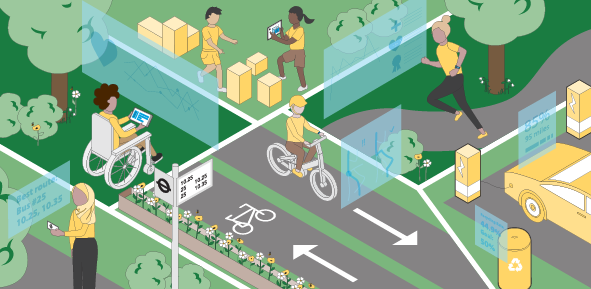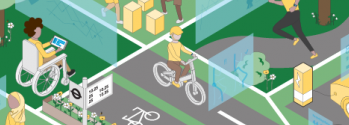
Our Challenge
We share and create more data than ever before, and businesses have already taken advantage, piecing together insights about our individual shopping habits, lifestyles and interests. But what if we could use data to create similar insights into buildings and infrastructure, and how we interact with them, so that they become the stage upon which our societies and families flourish? What if the built environment was designed to serve our best interests and the best interests of the generations that follow us? Realising CDBB’s vision of a future, in which infrastructure was a platform for human flourishing, was a long journey, with many challenges along the way. But CDBB focused on supporting the transformation of the industry to one that is resilient and efficient and also created a built environment that is better for everyone.
Our Solution
To secure a future where data is used to develop a built environment for the public good, CDBB hosted an interdisciplinary research programme across UK institutions that were exploring issues around society, policy, housing, the economy, nature, value and many other issues that touch the daily lives of people in a digital built Britain.
Projects within this theme
| Projects within this theme | Lead researcher |
|---|---|
|
Analysing the social context to transforming construction through digital innovation Analysing the interactions between technology and digital innovation and the different stakeholders, including local government, planners, financiers and insurers/warranty providers, to understand their role in enabling the transformation of construction through digitisation. |
Dr Gemma Burgess |
|
Stakeholder Engagement in Smart Cities and Digital Infrastructure Projects Considering effective stakeholder engagement in Smart Cities and Digital Infrastructure projects, including individuals, communities, interest groups, local authorities, universities, businesses and other users of the built environment. |
Dr Gemma Burgess |
|
Facilitating the digitisation of off-site manufacturing Gathering evidence from successful and unsuccessful use cases to measure outcomes and benefits of innovation, while trying to understand challenges and learning valuable lessons across sectors. |
Dr Mohamed Zaki |
|
Smart Hospital of the Future: Digital technologies, service innovation, and hospital design The project focuses on how new technology, in particular, telemedicine and AI which is transforming how Moorfields’ services are being provided to visually-impaired patients at the organisational frontline. |
Prof Michael Barrett |
|
Co-Creating a City-Scale Digital Strategy and Framework: A Systems and Co-production Approach Investigating how collaboration between public authorities, private business and other city stakeholders can enhance the benefits of ‘smart’ digitally enabled infrastructure and other built assets for the benefit of urban populations. |
Dr Ges Rosenberg |
|
Housing Digital Built Britain Network The Housing Digital Built Britain Network brought together academics, practitioners, policy makers and government to facilitate dialogue and determine key areas of inquiry. Priority research areas were identified, including using digital innovations to meet the housing and care challenges of an ageing population; developing digital innovation and better use of data in the planning system and digitising housing production through off-site housing manufacture. |
Dr Gemma Burgess |
|
Building Interactive Smart Acoustics into Buildings and Clothing Building multiple microphone sensors and ways to interrogate the acoustic environment into wearable technologies for hearing-impaired users, including children in schools. Making the built environment more accessible by increasing the flexibility of auditory feedback loops between buildings and hearing aids. |
Dr Anurag Agarwal |
|
Defining the barriers and opportunities for adopting BIM in the UK housing sector and highlighting its great benefits. |
Dr Gemma Burgess |
|
The local governance of digital technology – implications for the cityscale digital twin Understanding governance for digital twins and the ways in which it is generalisable to successfully transfer knowledge and best practices among different cities within the UK and beyond. Includes the development of a digital twin prototype for the Cambridge area. |
Dr Timea Nochta |
|
Designing Safe Complex Environments Creating a VR environment that reduces usability issues in order to test virtual built environment designs with users who have a balance or sensory impairment. This will ensure the built environment is designed with neurodiversity in mind.
|
Dr Thomas Stone |
|
Network - Pedagogy and Upskilling Network (PUN) A research network aiming to define the capacity gaps and propose a transitional roadmap for education and upskilling to address the current digital skills gap and building capacity required for the UK to benefit from digital built Britain. |
Prof. Jason Underwood |
|
Understanding the extent to which the UK planning system is engaging with BIM at different spatial scales (e.g., individual building, development scheme, city, region). Exploring how the planning system could better help deliver BIM and inform local and national policy actors. |
Prof Phil Allmendinger |
|
Investigating how European cities are adapting to BIM and what awareness there is of BIM in future city thinking and strategies. Identifying what tools and policies are being used to take forward BIM in city development, as well as existing barriers. |
Dr Franziska Sielker |
|
Building Impulse: A novel digital toolkit for productive, healthy and resource-efficient buildings Creating a toolkit for capturing occupant satisfaction with their environment in buildings in order to feed the next generation of smart buildings with a more holistic set of metrics for comfort and enjoyment of a space. |
Dr Mauro Overend |
|
Visualising the Future: Big Data and the Built Environment Examining the future use of big data in the built environment, this report builds on four years of material generated by the Cambridge Forum for Sustainability and Environment. Experts from academia, government and private companies were invited to join monthly discussions and big data within cities was a recurring theme. |
Prof Paul Linden |

